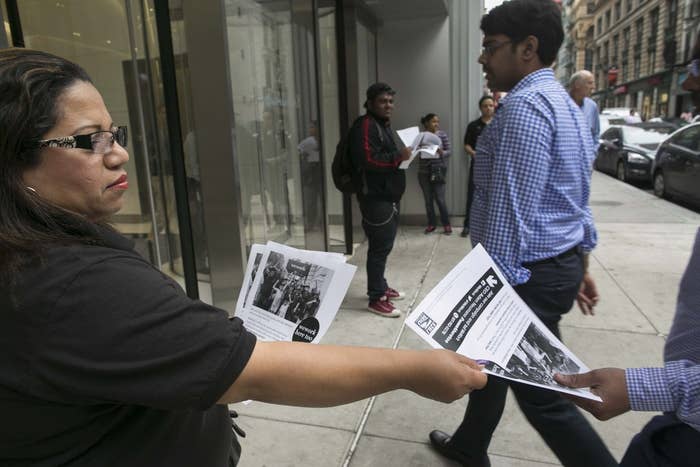
Many of WeWork's New York-based cleaning staff are set to lose their jobs, just weeks after protesting for higher pay and better working conditions at the shared office space provider.
WeWork, which was valued at $10 billion in a funding round last month, currently uses a non-union contractor to provide cleaners for its New York buildings. The contractor pays less than half the standard wage paid to the majority of the city's janitors, who are unionized.
In mid-June, janitors and supporters protested at WeWork's Manhattan headquarters, asking for higher pay and better benefits. A local branch of the Service Employees International Union later filed a complaint alleging WeWork threatened to have cleaners fired if they unionized.
The contract between WeWork and the contractor, Commercial Building Maintenance, was terminated about a week after the June 18 protest, WeWork said today. Workers say they began hearing that their jobs may not be secure in recent weeks, and were recently notified that the work cleaning WeWork's buildings would end on August 23.
"We hope the workers would get re-hired because they've all been working there in good standing for months or years without any problems," said Rachel Cohen, a representative of the SEIU, which has backed the protests. "It's quite standard with these types of contracts for the cleaners to keep their jobs and just be employed by someone new."
A WeWork spokesperson said in a statement: "CBM terminated their contract with WeWork on June 25. We are currently working to make sure we have uninterrupted cleaning service for our members." CBM did not respond to requests for comment.
While several of the workers contracted through CBM have re-applied for their current jobs directly with WeWork, according to Cohen, others have not interviewed or received information about the future of their jobs.
Because WeWork does not directly employ its cleaners, instead contracting the work through CBM, the end of the contract effectively terminates the current workforce of cleaners, without the company firing a single worker. WeWork may have the option of re-hiring the workers in-house, through a contract negotiated with a different company, or not at all.
Once word came of the contract termination, workers began sending letters to the company to apply for their existing positions with whomever the new employer is, according to Cohen. Over the next week, the SEIU is organizing leafletting and other actions at WeWork buildings to inform its tenants about the contract change.
